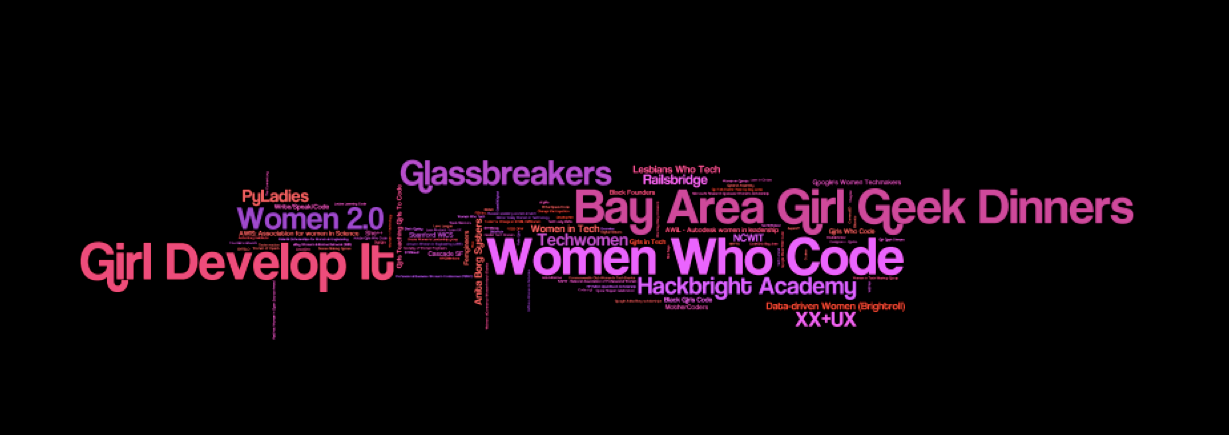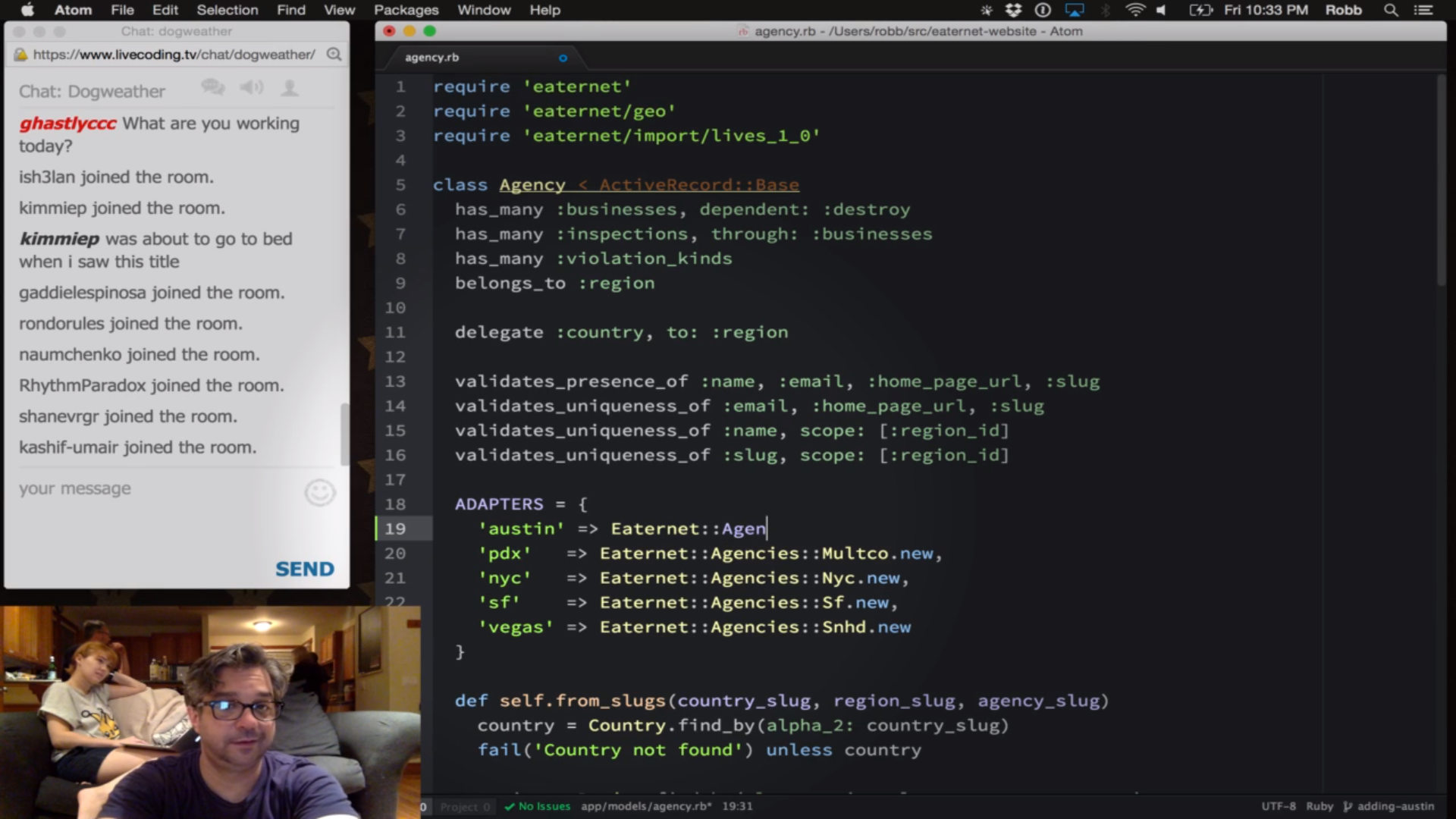This is a comprehensive list in Medium.
Thanks, +Leia Ferrari
Thursday, August 27, 2015
It Was Easier to Give in Than Keep Running
Tough to read piece on one woman's coming of age reflection.
Trigger warning: sexual assault content
Trigger warning: sexual assault content
Wednesday, August 26, 2015
Tuesday, August 25, 2015
8 Reasons Everyone Should Learn How To Code
What my LinkedIn looks like now:
Thanks, +Nat Lavin
2. Potential employers will start jumping in front of your car: With a valuable skill like coding, you’ll notice a sharp uptick in potential employers immediately throwing themselves in front of your vehicle. Just another advantage of being a programmer!For some more chuckles, check out the post in Clickhole.
Thanks, +Nat Lavin
Monday, August 24, 2015
Sunday, August 23, 2015
The Coddling of the American Mind
"In the name of emotional well-being, college students are increasingly demanding protection from words and ideas they don’t like. Here’s why that’s disastrous for education—and mental health."
Read more in the Atlantic.
Read more in the Atlantic.
HBR Daily Stat: Being Busy Isn’t the Same as Being Productive
The stat:
Research has found that people have a natural aversion to idleness: we’ll go out of our way to stay busy, even if we have to invent things to do. But being too busy can be counterproductive. Studies have also shown that we have a bias toward action: when faced with a problem, we prefer to act, even if it would be best to pause first or do nothing. Together, both of these behaviors show that choosing to be busy is the easy choice. Being productive, by contrast, is much more challenging. What helps remedy this dilemma? Take time to step back and reflect on a regular basis. Reflection helps us understand the actions we’re considering and choose the ones that will make us productive. Even 15 minutes of planning each morning can help. So the next time you feel busy, stop and think about what you actually need to get done.Read more in HBR.
Thought these were good tips:
Read more in BarkingUpTheWrongTree.
- Don't say: “That reminds me of the time… ” because what they'll hear is: “I can top that.”
- Don't say: “Haven’t we talked about this before?” because what they'll hear is: “Why are you still hung up about this?”
- Don't say: “No, actually…" because what they'll hear is: "I am right; you’re wrong.”
- Don't say: "I understand" because what they'll hear is: "I get it. You don't need to keep talking."
- And don't say: "I know how you feel." Instead, ask them how they feel.
Read more in BarkingUpTheWrongTree.
The Strange Appeal of Watching Coders Code
"Legions of programmers now stream their work on Livecoding.tv, a site that turns their lonely labor into something more like a party."
Read more in Medium.
Read more in Medium.
The Post-YC Slump
Read more about "real" vs "fake" work on Sam Altman's blog. A few favorite excerpts:
Fake work is both easier and more fun than real work for many founders. Two particularly bad cases are raising money and getting personal press; we’ve seen many promising founders fall in love with one or (usually) both of these, which nearly always ends badly.
... There are a few other common problems. One is a feeling of “we made it” that comes after a big financing round and a reduction in intensity. A related problem is that after you’ve raised a lot of money or become somewhat well-known, it’s harder to admit that things aren’t working and you need to change direction. Also, very small startups can grow by sheer force of will, even with a bad product. This stops working after a few months as the numbers get larger, and if you haven’t built something people love, you will not be able to continue growing.
... Don’t ever let yourself feel like you’ve won before you have. I still don’t think the Airbnb founders feel like they’ve won. You have to keep up a high level of intensity for many, many years.
16 Startup Metrics
An excerpt:
We have the privilege of meeting with thousands of entrepreneurs every year, and in the course of those discussions are presented with all kinds of numbers, measures, and metrics that illustrate the promise and health of a particular company. Sometimes, however, the metrics may not be the best gauge of what’s actually happening in the business, or people may use different definitions of the same metric in a way that makes it hard to understand the health of the business.
So, while some of this may be obvious to many of you who live and breathe these metrics all day long, we compiled a list of the most common or confusing ones. Where appropriate, we tried to add some notes on why investors focus on those metrics. Ultimately, though, good metrics aren’t about raising money from VCs — they’re about running the business in a way where founders know how and why certain things are working (or not) … and can address or adjust accordingly.Read more in a16z.
Friday, August 21, 2015
2 Graduating Rangers, Aware of Their Burden
"Two Army Ranger graduates are set to break new ground in the military as the Pentagon prepares to decide which combat positions should be opened to women."
Read more in the NYT.
Read more in the NYT.
Thursday, August 20, 2015
Wednesday, August 19, 2015
Tuesday, August 18, 2015
The Toddler at Y Combinator
"For three months, Julia Kurnia took her nonprofit through the famed startup accelerator -- all while caring for her two-year-old son, alone."
Read more at FastCompany.
Read more at FastCompany.
Monday, August 17, 2015
Friday, August 14, 2015
'Haha' has killed 'lol,' says Facebook
An excerpt:
If you still "lol" at jokes online then you might be in the minority. A new report from Facebook into how users express laughter shows that "haha" and its variants are by far the most common terms used on the social network. They accounted for 51.4 percent of mirth in the anonymized comments and posts looked at by Facebook's data team, with laughter emoji claiming 33.7 percent, and "hehe" and its cognates 13.1 percent. The once-mighty "lol" only appeared in 1.9 percent of the text sampled by Facebook — a pretty staggering fall for an expression that was once synonymous with online txt speakRead more in the Verge.
Tinder and the Dawn of the “Dating Apocalypse”
Argh. Painful to read. Check out the story in Vanity Fair.
Tuesday, August 11, 2015
Monday, August 10, 2015
Patek Philippe Grandmaster Chime Ref. 5175 - The sound of history
Embedding is disabled, but you can check out this engineering marvel on YouTube.
Thanks, +Tim Cannady
Thanks, +Tim Cannady
Saturday, August 8, 2015
Chilly at Work? Office Formula Was Devised for Men
Was hesitant to post this, but it has data. An excerpt:
Thanks, +Alexandra Davis and +Katherine Stiner
Finally, scientists (two men, for the record) are urging an end to the Great Arctic Office Conspiracy. Their study, published Monday in the journal Nature Climate Change, says that most office buildings set temperatures based on a decades-old formula that uses the metabolic rates of men. The study concludes that buildings should “reduce gender-discriminating bias in thermal comfort” because setting temperatures at slightly warmer levels can help combat global warming.Read more in the NYT. And more in NY Mag.
Thanks, +Alexandra Davis and +Katherine Stiner
My wedding was perfect – and I was fat as hell the whole time
"As a fat woman, you are told to disguise, shrink or flatter your body. But I wasn’t going to hide at my wedding – the older I get, the harder it is to depoliticise simple acts"
Check out Lindy West's piece in the Guardian.
Check out Lindy West's piece in the Guardian.
Homme de Plume: What I Learned Sending My Novel Out Under a Male Name
"The plan made me feel dishonest and creepy, so it took me a long time to send my novel out under a man’s name. But each time I read a study about unconscious bias, I got a little closer to trying it."
Both surprised and not surprised. Read the story in Jezebel.
Both surprised and not surprised. Read the story in Jezebel.
When a bad day gets worse—getting hacked twice in one day
Chris Poole of 4chan writes his experience and learnings getting hacked a year ago.
Friday, August 7, 2015
Thursday, August 6, 2015
Wednesday, August 5, 2015
Tuesday, August 4, 2015
Monday, August 3, 2015
Why Some Start-Ups Are Called Tech Companies and Others Are Not
Been wondering this for a while. Read more in the NYT.
Sunday, August 2, 2015
Jimmy Kimmel’s Plea for Cecil the Lion Is a Prime Example of Why Black Celebrities Need to Speak Out
An excerpt:
Not only did late-night host Jimmy Kimmel choke up while speaking against the recent killing of Cecil the Lion, he compared the public’s anger at the hunter to a Black man. Granted that Black man is now-notorious Bill Cosby, but the point remains the same. Believe it or not, white people in America care more about animals in Africa than they do about the African Diaspora.Read more in Atlanta Blackstar.
Saturday, August 1, 2015
Sleeping Bag Coat Designed For The Homeless Draws Attention From Fashion Industry
Read more in HuffPo.
Congrats Cassie on getting the offer to work with The Empowerment Plan this fall!!
A Brief Guide to Quitting a Bad Habit
If you're trying to quit any habits, thought this Zen Habits post was a punchy way to think about the steps to break them.
From Gamergate to Cecil the lion: internet mob justice is out of control
If you've ever been trolled online, or wonder what it would be like, read this Vox article. Internet mobs are scary.
Memory problems? Go climb a tree.
"Climbing a tree or balancing on a beam can dramatically improve cognitive skills, according to a study recently conducted by researchers in the Department of Psychology at the University of North Florida."
Read more in Kurzweil.net.
Read more in Kurzweil.net.
Subscribe to:
Comments (Atom)
Why Women Aren’t C.E.O.s, According to Women Who Almost Were
"It’s not a pipeline problem. It’s about loneliness, competition and deeply rooted barriers." Read more in the NYT .

-
"It’s not a pipeline problem. It’s about loneliness, competition and deeply rooted barriers." Read more in the NYT .
-
"Why I don’t talk about race with White people." Read more in Medium .








/cdn0.vox-cdn.com/uploads/chorus_asset/file/3954814/facebook_laughter_types__age_and_gender.0.jpg)



/cdn0.vox-cdn.com/uploads/chorus_image/image/46867282/GettyImages-482304598.0.0.jpg)